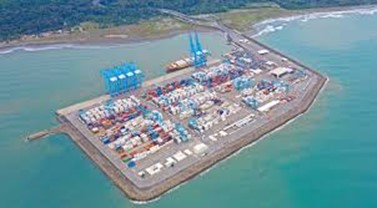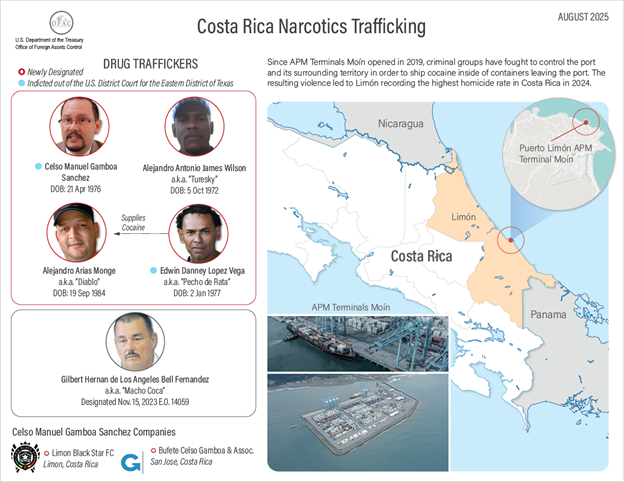Targets Face Extradition to the United States
WASHINGTON — Today, the Department of the Treasury’s Office of Foreign Assets Control (OFAC) designated four Costa Rican nationals, as well as two Costa Rica-based entities, for their involvement in narcotics trafficking and money laundering. A key global cocaine transshipment hub, Costa Rica has become an increasingly significant waypoint for criminal groups trafficking cocaine into the United States. According to the Drug Enforcement Administration (DEA), cocaine continues to pose a serious threat to the public, causing over 22,000 overdose deaths in the United States in the 12-month period ending in October 2024.
“Drug cartels are poisoning Americans and making our communities more dangerous by trafficking cocaine, often laced with fentanyl, into the United States,” said Under Secretary for Terrorism and Financial Intelligence John K. Hurley. “The sanctions being issued today target key drug smugglers involved in transporting drugs into the United States. Treasury, in close coordination with U.S. law enforcement and our Costa Rican partners, will continue to use all available tools to disrupt narcotrafficking organizations that threaten the safety of Americans.”
Today’s action is the culmination of a coordinated investigation with the DEA San José Country Office, the DEA Dallas Field Office, and Costa Rica’s Office of the Attorney General.
DRUG TRAFFICKING CONTINUES TO DRIVE VIOLENCE
Costa Rica continues to see increasing rates of violence, primarily driven by criminal organizations competing for control of drug trafficking routes. Data shows that 2024 was the second-most violent year on record for Costa Rica, and the data for 2025 thus far indicates the country is on pace for a similarly violent year. Costa Rican security and police officials attribute the increase in violence to drug trafficking organizations fighting over control of territory in the country. One region of Costa Rica where violence has increased significantly is Limón, which recorded the highest homicide rate in the country in 2024. Since the 2019 opening of the Moín seaport in Limón, criminal groups have continued to fight for control the port and its surrounding territory to ship cocaine inside containers leaving the port.

APM Terminals Moin in Limón, Costa Rica
Today’s action builds on OFAC’s previous collaboration with the DEA in Costa Rica. On November 15, 2023, OFAC designated one of the most prolific drug traffickers in Limón—Costa Rican narcotics trafficker Gilbert Hernan de Los Angeles Bell Fernandez (Bell)—pursuant to Executive Order (E.O.) 14059 for the significant role he played in Costa Rica’s transformation into a major narcotics transit hub as well as the violence associated with his operations.
COUNTERING DRUG TRAFFICKING IN COSTA RICA
In May 2025, Costa Rica’s President signed a constitutional reform allowing the extradition of Costa Rican nationals accused of drug trafficking and terrorism, to include two of the individuals being targeted today: Celso Manuel Gamboa Sanchez (Gamboa) and Edwin Danney Lopez Vega (Lopez).
On June 23, 2025, Costa Rican police arrested Gamboa and Lopez on drug trafficking charges in response to an extradition request from the United States. Prior to his arrest, Gamboa was a major drug trafficker in Costa Rica. Gamboa had facilitated the shipment of tens of millions of dollars’ worth of cocaine from Colombia through Costa Rica to the United States and Europe.
As a former Costa Rican Vice Minister of Public Security, Gamboa used his extensive network of contacts within the government to acquire information about ongoing counternarcotics investigations. He subsequently sold this information to the targets of those exact investigations. Gamboa worked with narcotics traffickers across Costa Rica, bribing police and government officials to facilitate cocaine transport. He worked with numerous drug traffickers in Costa Rica, including OFAC-designated Bell, Alejandro Antonio James Wilson (James), Alejandro Arias Monge (Arias), and the now-incarcerated Lopez.
Gamboa also laundered his illicit drug proceeds through his companies in Costa Rica, two of which are being targeted today: Bufete Celso Gamboa & Asociados (Bufete) is a “doing business as” name and a sole proprietorship owned by Gamboa and headquartered in San José, and Limón Black Star FC (Limón) is a Limón-based soccer club in Costa Rica’s second division, which Gamboa also used to launder money.
James is a Costa Rican drug trafficker who shipped cocaine to the United States and Europe. Working closely with Gamboa, James used corrupt police and port officials to smuggle cocaine from Colombia into Costa Rica and then transship it to its destination through the Moín seaport.
Arias is a cocaine trafficker and Costa Rica’s most wanted fugitive. Another associate of Bell, Arias is involved in drug trafficking, robberies, and homicides throughout Limón province. Utilizing information from Gamboa’s government contacts to evade capture operations, Arias has been able to avoid arrest. The Department of State is offering a reward under the Transnational Organized Crime Rewards Program (TOCRP) of up to $500,000 for information leading to the arrest and/or conviction, in any country, of Arias.
Lopez is a Costa Rican drug trafficker based in Limón, Costa Rica. Also known as “Pecho de Rata,” he is the only known source of supply for Arias and works with James and Gamboa to traffic cocaine through Costa Rica. Lopez and Gamboa also work together to launder drug money.

Gamboa, James, Arias, and Lopez are being designated pursuant to E.O. 14059 for having engaged in, or attempted to engage in, activities or transactions that have materially contributed to, or pose a significant risk of materially contributing to, the international proliferation of illicit drugs or their means of production.
Bufete and Limón are designated pursuant to E.O. 14059 for being directed by, or having acted or purported to act for or on behalf of, directly or indirectly, Gamboa.
SANCTIONS IMPLICATIONS
As a result of today’s action, all property and interests in property of the designated or blocked persons described above that are in the United States or in the possession or control of U.S. persons are blocked and must be reported to OFAC. In addition, any entities that are owned, directly or indirectly, individually or in the aggregate, 50 percent or more by one or more blocked persons are also blocked. Unless authorized by a general or specific license issued by OFAC, or exempt, OFAC’s regulations generally prohibit all transactions by U.S. persons or within (or transiting) the United States that involve any property or interests in property of blocked persons.
Violations of U.S. sanctions may result in the imposition of civil or criminal penalties on U.S. and foreign persons. OFAC may impose civil penalties for sanctions violations on a strict liability basis. OFAC’s Economic Sanctions Enforcement Guidelines provide more information regarding OFAC’s enforcement of U.S. economic sanctions. In addition, financial institutions and other persons may risk exposure to sanctions for engaging in certain transactions or activities involving designated or otherwise blocked persons. The prohibitions include the making of any contribution or provision of funds, goods, or services by, to, or for the benefit of any designated or blocked person, or the receipt of any contribution or provision of funds, goods, or services from any such person.
Furthermore, engaging in certain transactions involving the persons designated today may risk the imposition of secondary sanctions on participating foreign financial institutions. OFAC can prohibit or impose strict conditions on opening or maintaining, in the United States, a correspondent account or a payable-through account of a foreign financial institution that knowingly conducts or facilitates any significant transaction on behalf of a person who is designated pursuant to the relevant authority.
The power and integrity of OFAC sanctions derive not only from OFAC’s ability to designate and add persons to the Specially Designated Nationals and Blocked Persons List (SDN List), but also from its willingness to remove persons from the SDN List consistent with the law. The ultimate goal of sanctions is not to punish, but to bring about a positive change in behavior. For information concerning the process for seeking removal from an OFAC list, including the SDN List, or to submit a request, please refer to OFAC’s guidance on Filing a Petition for Removal from an OFAC List.
To view the chart on the persons designated today, click here.
For more information on the persons designated today, click here.
###
